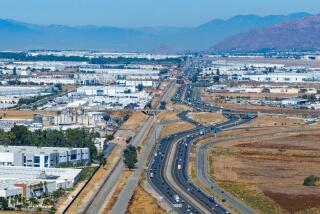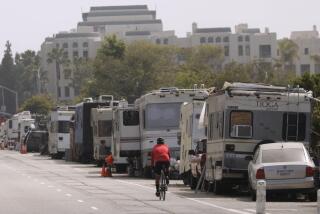Cities kicking the tires on new ideas for vacant auto lots
In Whittier, city officials are clearing the way for office buildings, retail shops and even homes to take root on the land where the vacant car lots stand.
Classrooms offering lessons on green technology are being considered as a replacement for the deserted dealerships in Riverside County. And in coastal Ventura, a card club could soon take up residence among the Toyotas, Chevys and Jaguars being sold at the struggling Ventura Auto Center.
For decades, cities have set aside vast expanses of land for auto malls and the dealerships have rewarded them with a steady flow of tax dollars, often providing 20% or more of an average town’s sales receipts. But now some local governments are ready to declare the auto mall a dinosaur.
“It reminds me a lot of the regional malls back in the ‘90s,” said Bill Fulton, an urban planning analyst and senior scholar at USC’s School of Policy, Planning and Development. “They were these incredible retail fortresses that suddenly become vulnerable.”
Pushed out of business by the recession’s grip and a retrenchment at General Motors Co. and Chrysler Group, dealerships in California have closed at an accelerating rate -- rocketing from 24 closures in 2007 to 260 in the last two years, said Peter Welch, executive director of California New Car Dealers Assn.
There are roughly 9.1 million square feet of empty buildings sitting on more than 1,000 acres of prime commercial real estate. The changed landscape has left cities scrambling to make up the lost revenue.
Despite the numbers, Welch and other industry analysts believe that auto centers are not about to disappear. New franchises will reoccupy some of the shuttered dealerships once the economy improves, they say.
But fundamental changes in the way cars are marketed point to fewer car lots in the future, Fulton said. As buyers turn to the Internet to find good deals and seek out sellers they don’t have to haggle with, the look of the traditional auto mall may change, he said.
Some of the shuttered dealerships have already reopened as used-car lots or car service hubs, a natural progression for what is considered “special purpose” real estate, said Jodi Meade, director of the automotive properties group at brokerage CB Richard Ellis. Reinventing them for other uses can be tricky, Meade said.
Although some dealerships could simply be erased from the landscape, older properties could have underground storage tanks and lubricant seepage that present costly and time-consuming cleanup challenges, Meade said.
However, free-standing dealerships that are vacant could be ideal for medical, retail or industrial companies and even some housing, Meade said. Clusters of such traditional car lots, like those along Van Nuys Boulevard in the San Fernando Valley, are typically found in older communities, she said.
Auto showrooms taking on new lives is nothing new. The Golden Bridge Yoga studio in Hollywood is the site of a former car dealership. A decade ago, William L. Morris Chevrolet in Fillmore served Italian dinners on red-checkered tablecloths at a restaurant in its dealership.
Some cities are taking the lead by changing the zoning laws that dictate what Main Street will look like.
Whittier, for instance, decided to shift away from auto-specific zoning for a swath of Whittier Boulevard when it lost four of its nine dealerships, said Jeff Collier, director of community development. The city now is looking at other types of retail, such as furniture stores, or even office buildings that include housing, he said.
“We don’t want to see vacant lots lying fallow and unproductive,” Collier said. “We have lost hundreds of thousands of dollars in sales taxes.”
The Ventura City Council held a similar view in allowing the Ventura Auto Center’s landlord to expand his card club operation in another part of the city to the auto mall site. It could open in a former Volvo or Saturn dealership, next to Land Rovers, Kias and Jeeps. The city collects sales taxes on the card club’s receipts. “They have six tables on Ventura Avenue but are authorized to have 18,” said planning analyst Fulton, who is also Ventura’s mayor. “It’s a lucrative proposition for everybody.”
Riverside County officials are hedging their bets. On one hand, they are trying to win back car buyers by conducting a study to find out why so many of their residents are shopping for vehicles outside the county, typically in Orange and Los Angeles counties.
But even if they bring back some of that business, the county and its 26 cities might be willing to convert some of the vacant lots to other uses, said Tom Freeman, a trade official in the Economic Development Agency.
“It’s clear that the Obama administration is going to shove more money toward community colleges and train more people in vocational schools,” he said. “Why can’t a vocational or community college come up with a certificate to work on hybrid cars?”
Other municipalities are circling the wagons, at least for now.
Cerritos is negotiating to buy a parcel in the Cerritos Auto Square that has been vacant since a Hyundai franchise moved to another location nearby, City Manager Art Gallucci said. The city wants to get a new tenant into the space as quickly as possible, he said.
San Bernardino last year fronted $1.5 million to auto dealers to spruce up landscaping and signage around franchises. Seven of the city’s 12 dealerships have closed. The city last year waived sales taxes for a time to help spur activity, said Jim Morris, chief of staff to the city’s mayor.
It’s too early to say whether San Bernardino will throw in the towel and try something else, he said.
“It’s not like anyone’s knocking down our doors and demanding that we put in a Target,” Morris said.
Fulton sees the retrenchment as the result of cities competing with one another for a shrinking new-car sales pie.
It might make more sense, he said, for local governments to start adapting to the new economics.
“There will be some winners and losers,” he said. “And the losers will have to figure out something else.”
catherine.saillant@
latimes.com
More to Read
Inside the business of entertainment
The Wide Shot brings you news, analysis and insights on everything from streaming wars to production — and what it all means for the future.
You may occasionally receive promotional content from the Los Angeles Times.











